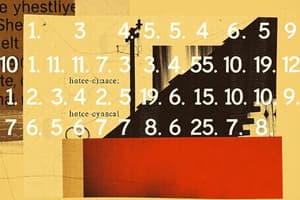Podcast
Questions and Answers
What is the alphabetical position of the letter 'n' in the modern English alphabet?
What is the alphabetical position of the letter 'n' in the modern English alphabet?
- 12th
- 14th (correct)
- 16th
- 18th
What does the letter 'n' represent in the International Phonetic Alphabet (IPA)?
What does the letter 'n' represent in the International Phonetic Alphabet (IPA)?
- A voiced alveolar nasal consonant (correct)
- A voiced velar plosive
- A voiced palatal approximant
- A voiced bilabial plosive
How is the sound of the letter 'n' produced?
How is the sound of the letter 'n' produced?
- By blocking the airflow with the lips and releasing it through the mouth
- By tapping the tongue on the roof of the mouth
- By blocking the airflow with the tongue and releasing it through the nose (correct)
- By vibrating the vocal cords and releasing it through the mouth
How frequent is the use of the letter 'n' in the English language?
How frequent is the use of the letter 'n' in the English language?
What is the origin of the modern English letter 'n'?
What is the origin of the modern English letter 'n'?
Flashcards are hidden until you start studying
Study Notes
The Letter "n"
Alphabetical Position
- The letter "n" is the 14th letter of the modern English alphabet.
Phonetic Representation
- In the International Phonetic Alphabet (IPA), the letter "n" represents a voiced alveolar nasal consonant (/n/).
Sound and Pronunciation
- The sound of the letter "n" is a nasal sound, made by blocking the airflow with the tongue and releasing it through the nose.
- The pronunciation of "n" varies depending on the language and dialect.
Frequency of Use
- The letter "n" is one of the most frequently used letters in the English language.
Etymology
- The letter "n" originates from the ancient Greek letter ν (nu).
- The modern English letter "n" is derived from the Latin letter N, which was adapted from the Greek nu.
The Letter "n"
Alphabetical Position
- The 14th letter of the modern English alphabet is "n".
Phonetic Representation
- In the International Phonetic Alphabet (IPA), /n/ represents a voiced alveolar nasal consonant.
Sound and Pronunciation
- The sound of "n" is a nasal sound, made by blocking airflow with the tongue and releasing it through the nose.
- The pronunciation of "n" varies depending on the language and dialect.
Frequency of Use
- "n" is one of the most frequently used letters in the English language.
Etymology
- The ancient Greek letter ν (nu) is the origin of the letter "n".
- The modern English letter "n" is derived from the Latin letter N, adapted from the Greek nu.
Studying That Suits You
Use AI to generate personalized quizzes and flashcards to suit your learning preferences.




